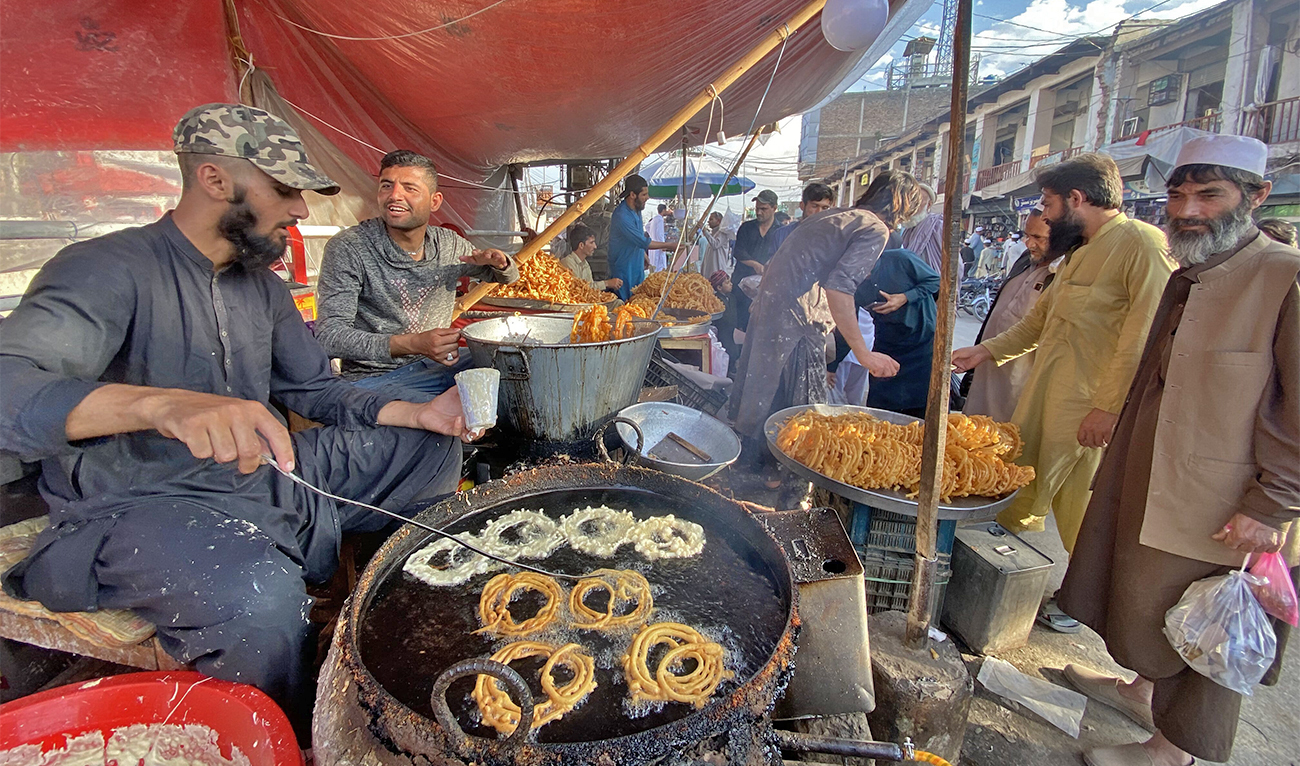PESHAWAR: At the entrance of Board Bazar in the northwestern Pakistani city of Peshawar and through the evening hustle and bustle as iftar time approaches, people can be seen lining up to pick up their favorite Ramadan treat from a long beloved stall: the famous Afghan Jalebi Wala.
Board Bazar is also known as Waroki Kabul, or Mini Kabul, because the majority of businesses in the area belong to refugees from Afghanistan, many of whom moved to this part of Pakistan in the late seventies when Soviets launched an invasion in the neighboring country. Along the streets of the Bazar, one can hear Dari being spoken, or Pashto with an Afghan accent, while traditional Afghan attire, robes and caps, are displayed in shop windows. And a lot of customers are there for one thing: jalebi, a funnel-cake-like treat made by piping spirals of slightly fermented batter into hot oil, and then soaking the whorls in warm sugar syrup.
The site of the sweet treats, the Afghan Jalebi Wala stall, was set up by a refugee named Ashiqullah in the early 1980s and has since made a name across Peshawar and the northwestern Khyber Pakhtunkhwa province. The business is now run by the original owner’s sons, including Nasratullah, 22, who was busy at the shop close to iftar time earlier this Ramadan, packing hot, syrup-soaked jalebis into paper bags for lines of hungry customers.
“In the holy month of Ramadan, lots of people take jalebis for Khatm-ul-Qur’an [during taraweeh evening prayers] and iftar,” Nasratullah told Arab News, saying many people got jalebis packed to send to friends and relatives in other parts of the country, including Islamabad and Rawalpindi. Within Khyber Pakhtunkhwa province, orders of jalebis were also dispatched to far-flung areas like Dir and Chitral.
“The Afghans eat jalebis with qahwa or green tea and our Pakistani brothers eat them with black tea or chai,” Nasratullah said, as he listed differences between the Afghan and Pakistani varieties, including that no food color was used in the Afghan version, while the Pakistani varieties were dyed a deep orange.
“These [Afghan jalebis] are cooked thin and round and they [Pakistani varieties] are cooked thick and closely packed,” he added.

A tray of Afghan Jalebis is pictured in Peshawar's Board Bazar, Pakistan, on April 6, 2023. (AN photo)
Speaking about what made his jalebis famous, Nasrat Ullah smiled and said there was a secret ingredient that made them different from other types of jalebis, “We can’t tell anyone about the ingredient, it is our expertise.”
The sale of the special jalebis depended on the season, the shop owner said, with reduced sales in summer but a rise in winter and especially in Ramadan.
“The sale is around 550 kg to 600 kg per day and the price is Rs350 per kg,” Nasratullah said. “Everyone likes these jalebis, so a lot of rush is seen many of the times.”

The picture taken on April 6, 2023, shows Nasrat Ullah cooking Afghan Jalebis in Peshawar's Board Bazar, Pakistan. (AN photo)
One loyal customer, a 36-year-old doctor who only identified himself as Ibrahim, said his family liked to have the jalebis with tea for the iftar meal and it was also a tradition to distribute them at local mosques during taraweeh prayers.
“Whenever I come to Board Bazar, I must buy these jalebis,” said the doctor, who lives in another neighborhood of Peshawar and had especially come to the Bazar to buy jalebis.
“It has been 8 to 10 years since I had these jalebis for the first time,” another customer, Muslim Khan, said. “They are very delicious. I buy them because they are very tasty and my children eat them with love.”














